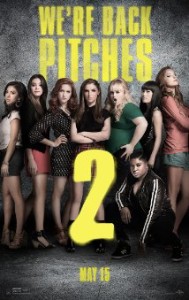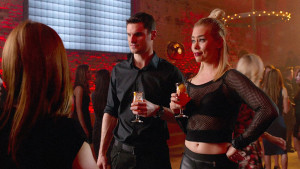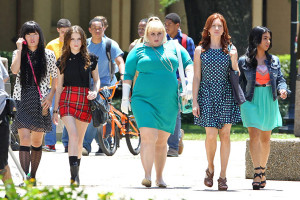 The central plot is pretty straight forward. It is one of redemption: the Barden Bellas seek to clear their soiled reputation and earn back the right to perform by being the first Americans to win an International a cappella competition. The film follows the group’s preparation for this last shot at fame and glory before most of them graduate and leave the Bellas behind.
The central plot is pretty straight forward. It is one of redemption: the Barden Bellas seek to clear their soiled reputation and earn back the right to perform by being the first Americans to win an International a cappella competition. The film follows the group’s preparation for this last shot at fame and glory before most of them graduate and leave the Bellas behind.
Following closely in the footsteps of its predecessor, Pitch Perfect, this film is full of musical performances and tongue-in-cheek, self-defacing humor. Lots of well written and well-performed hilarity, it is otherwise (in the words of the film) “–a heated mess. A mess where heat is applied to it so what once was a little messy is now even messier.” Mostly because there is a lot happening all at once–several threads that only loosely connect to the larger tapestry. Many of the scenes feel written for humor first before being considered story or character development, so they come off feeling indulgent. Add to this the fact that most serious or weighty moments are immediately diffused with a laugh and you have a film without much substance, populated by 2-dimensional characters who’re difficult to connect with.
Despite all this, Pitch Perfect 2 was thoroughly enjoyable. I chalk this up to the fact that the writing doesn’t take itself or its subject too seriously. It is constantly acknowledging nerdy, needlessly-intense, often over-sexualized elements of a cappella and performance culture–so we don’t have to! In doing this, it creates space for itself to have fun, and gives us permission to spent our time enjoying rather than being critical. Anything else the film ends up offering (cultural commentary, heartwarming moral) is just a bonus.
 Speaking of which, there actually is a measure or two of thematic depth underlying this film, about unity and the importance of community. The film takes us to this realization the long way ’round. The event that gets the Bellas in trouble truly is a mistake, out of their control, but it is the result of something they’ve allowed to happen: they are disjointed and have forgotten their identity as a group. As each girl struggles with the impending end of their college career and time with the Bellas, they become too preoccupied to invest in the community. This fragmentation is reflected in their performances, as they incorporate flashy choreography and props to cover for what they are lacking in musical cohesion. The Bella’s discord is only further highlighted by their biggest rival’s perfect performances: the German champions, a cappella group “Das Sound Machine,” are a well-oiled, flawless machine. Their choreography is very sterile and robotic to emphasize this metaphor. But the Bellas learn that if they are to beat the Germans (and everyone else), it will be because they have something that DSM does not: heart.
Speaking of which, there actually is a measure or two of thematic depth underlying this film, about unity and the importance of community. The film takes us to this realization the long way ’round. The event that gets the Bellas in trouble truly is a mistake, out of their control, but it is the result of something they’ve allowed to happen: they are disjointed and have forgotten their identity as a group. As each girl struggles with the impending end of their college career and time with the Bellas, they become too preoccupied to invest in the community. This fragmentation is reflected in their performances, as they incorporate flashy choreography and props to cover for what they are lacking in musical cohesion. The Bella’s discord is only further highlighted by their biggest rival’s perfect performances: the German champions, a cappella group “Das Sound Machine,” are a well-oiled, flawless machine. Their choreography is very sterile and robotic to emphasize this metaphor. But the Bellas learn that if they are to beat the Germans (and everyone else), it will be because they have something that DSM does not: heart.
The Bellas are successful as a group and as individuals only when their community is loving, vulnerable, and communicative. In their fear, they hide from each other and try to work through life’s biggest pressures (graduating, love, self-worth, career) on their own. And none of them get any closer to their goals. In the end, they find solace and strength in sharing their anxieties with one another. Although their fears and problems still exist, they find themselves grounded by something more lasting than money, career, or fame: friendship. Human beings are built to function as a community, not lone entities. Ecclesiastes 4:12 speaks to this: “Though one may be overpowered, two can defend themselves. A cord of three strands is not quickly broken.” This need for community is intrinsic to us. Innate. Natural. We get it from the origin of our image–a Maker who is one God in triune form. He has ever existed in community. The Father, Son, and Spirit are locked in an endless cycle of self-giving love that flows from one person of the Trinity to the other.
 A cappella is a great starting place to talk about the power of community and the folly of trying to go it alone. In an a cappella group, each member has a part to play, and it doesn’t function unless each person feels empowered to fulfill their unique roll. However loose and indulgent the plot felt, the tone, music and cast from Pitch Perfect 2 results in an entertaining experience, with even a little depth on the side. Quotable lines, laughs, and good a cappella: There is plenty here to enjoy (if you’ll let yourself admit it).
A cappella is a great starting place to talk about the power of community and the folly of trying to go it alone. In an a cappella group, each member has a part to play, and it doesn’t function unless each person feels empowered to fulfill their unique roll. However loose and indulgent the plot felt, the tone, music and cast from Pitch Perfect 2 results in an entertaining experience, with even a little depth on the side. Quotable lines, laughs, and good a cappella: There is plenty here to enjoy (if you’ll let yourself admit it).
